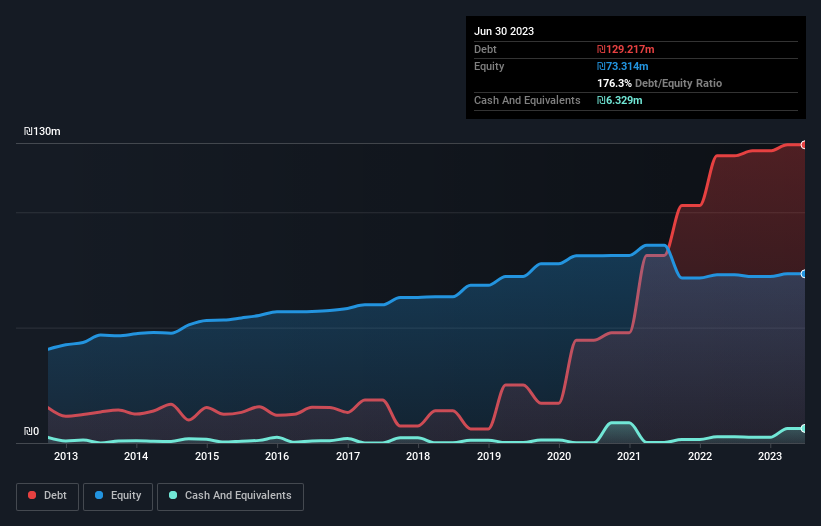Some say volatility, rather than debt, is the best way to think about risk as an investor, but Warren Buffett famously said that 'Volatility is far from synonymous with risk.' It's only natural to consider a company's balance sheet when you examine how risky it is, since debt is often involved when a business collapses. Importantly, Carmit Candy Industries Ltd. (TLV:CRMT) does carry debt. But is this debt a concern to shareholders?
What Risk Does Debt Bring?
Generally speaking, debt only becomes a real problem when a company can't easily pay it off, either by raising capital or with its own cash flow. If things get really bad, the lenders can take control of the business. While that is not too common, we often do see indebted companies permanently diluting shareholders because lenders force them to raise capital at a distressed price. Of course, plenty of companies use debt to fund growth, without any negative consequences. When we think about a company's use of debt, we first look at cash and debt together.
See our latest analysis for Carmit Candy Industries
What Is Carmit Candy Industries's Net Debt?
The chart below, which you can click on for greater detail, shows that Carmit Candy Industries had ₪129.2m in debt in June 2023; about the same as the year before. However, because it has a cash reserve of ₪6.33m, its net debt is less, at about ₪122.9m.

How Strong Is Carmit Candy Industries' Balance Sheet?
Zooming in on the latest balance sheet data, we can see that Carmit Candy Industries had liabilities of ₪113.8m due within 12 months and liabilities of ₪72.9m due beyond that. Offsetting these obligations, it had cash of ₪6.33m as well as receivables valued at ₪80.3m due within 12 months. So its liabilities total ₪100.1m more than the combination of its cash and short-term receivables.
This deficit casts a shadow over the ₪48.7m company, like a colossus towering over mere mortals. So we'd watch its balance sheet closely, without a doubt. After all, Carmit Candy Industries would likely require a major re-capitalisation if it had to pay its creditors today.
We measure a company's debt load relative to its earnings power by looking at its net debt divided by its earnings before interest, tax, depreciation, and amortization (EBITDA) and by calculating how easily its earnings before interest and tax (EBIT) cover its interest expense (interest cover). Thus we consider debt relative to earnings both with and without depreciation and amortization expenses.
Weak interest cover of 0.99 times and a disturbingly high net debt to EBITDA ratio of 7.1 hit our confidence in Carmit Candy Industries like a one-two punch to the gut. The debt burden here is substantial. One redeeming factor for Carmit Candy Industries is that it turned last year's EBIT loss into a gain of ₪7.6m, over the last twelve months. When analysing debt levels, the balance sheet is the obvious place to start. But it is Carmit Candy Industries's earnings that will influence how the balance sheet holds up in the future. So when considering debt, it's definitely worth looking at the earnings trend. Click here for an interactive snapshot.
Finally, a business needs free cash flow to pay off debt; accounting profits just don't cut it. So it is important to check how much of its earnings before interest and tax (EBIT) converts to actual free cash flow. During the last year, Carmit Candy Industries burned a lot of cash. While that may be a result of expenditure for growth, it does make the debt far more risky.
Our View
To be frank both Carmit Candy Industries's conversion of EBIT to free cash flow and its track record of staying on top of its total liabilities make us rather uncomfortable with its debt levels. Having said that, its ability to grow its EBIT isn't such a worry. We think the chances that Carmit Candy Industries has too much debt a very significant. To our minds, that means the stock is rather high risk, and probably one to avoid; but to each their own (investing) style. The balance sheet is clearly the area to focus on when you are analysing debt. However, not all investment risk resides within the balance sheet - far from it. To that end, you should learn about the 5 warning signs we've spotted with Carmit Candy Industries (including 3 which can't be ignored) .
At the end of the day, it's often better to focus on companies that are free from net debt. You can access our special list of such companies (all with a track record of profit growth). It's free.
New: AI Stock Screener & Alerts
Our new AI Stock Screener scans the market every day to uncover opportunities.
• Dividend Powerhouses (3%+ Yield)
• Undervalued Small Caps with Insider Buying
• High growth Tech and AI Companies
Or build your own from over 50 metrics.
Have feedback on this article? Concerned about the content? Get in touch with us directly. Alternatively, email editorial-team (at) simplywallst.com.
This article by Simply Wall St is general in nature. We provide commentary based on historical data and analyst forecasts only using an unbiased methodology and our articles are not intended to be financial advice. It does not constitute a recommendation to buy or sell any stock, and does not take account of your objectives, or your financial situation. We aim to bring you long-term focused analysis driven by fundamental data. Note that our analysis may not factor in the latest price-sensitive company announcements or qualitative material. Simply Wall St has no position in any stocks mentioned.
About TASE:CRMT
Carmit Candy Industries
Develops, produces, markets, exports, imports, and sells chocolates, baked goods, spreads, granola, frozen snacks, marshmallows, and tropicals in Israel and internationally.
Low risk and slightly overvalued.
Market Insights
Community Narratives



